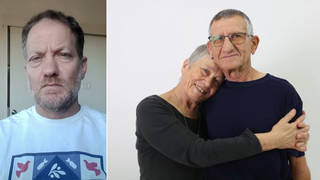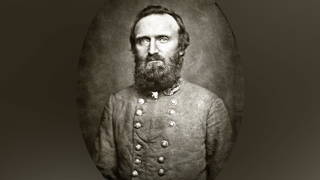
Guests
- Jack Christiangreat-great-grandson of Confederate General Stonewall Jackson.
- Warren Christiangreat-great-grandson of Confederate General Stonewall Jackson.
As President Trump faces growing outrage over his response to the deadly white supremacist rally in Charlottesville, Virginia, we bring you an exclusive: an interview with the great-great-grandsons of Confederate General Stonewall Jackson. At least 1,500 symbols of the Confederacy can be found in public spaces across the country. But now a number of the monuments are coming down. Calls for the removal of the statues are even coming from the descendants of the leaders of the Confederacy. We speak with two of the great-great-grandsons of Confederate General Stonewall Jackson. Jack and Warren Christian have just written an open letter to the mayor of Richmond calling for the removal of the Stonewall Jackson statue in Richmond. They write, “Our sense of justice leads us to believe that removing the Stonewall statue and other monuments should be part of a larger project of actively mending the racial disparities that hundreds of years of white supremacy have wrought.”
Transcript
AMY GOODMAN: Momentum is growing across the country to remove Confederate statues in the wake of Saturday’s deadly white supremacist, neo-Nazi rally in Charlottesville, Virginia. At least 1,500 symbols of the Confederacy can be found in public spaces across the country. According to the Southern Poverty Law Center, most of them were built during the early decades of Jim Crow or in reaction to the civil rights movement—not after the Civil War. But now a number of the monuments are coming down. In Baltimore, the city, under orders from the mayor, has just removed all four of its Confederate statues. In Durham, North Carolina, protesters toppled a Confederate statue after a college student named Takiyah Thompson climbed up a ladder and looped a rope around the top of the Confederate Soldiers Monument. She appeared on Democracy Now! just before going to court on Wednesday.
TAKIYAH THOMPSON: And I did this because the statue is a symbol of nationalism, and it’s a symbol of white nationalism. And the type of white nationalism I’m talking about is the type of white nationalism that is sending me death threats on Facebook. I’m talking about the type of white nationalist that, you know, has killed a woman in a protest.
AMY GOODMAN: Meanwhile, on Wednesday, in Brooklyn, New York, the Episcopal Church removed two plaques honoring Robert E. Lee. On Monday, a monument to Confederate soldiers in Gainesville, Florida, was also removed. And several other Confederate monuments are slated to be removed across the country. On Wednesday, Virginia Governor Terry McAuliffe encouraged all local governments to remove Confederate monuments, saying they’ve become “flashpoints for hatred, division and violence,” unquote.
And the calls for the removal of the statues are even coming from the descendants of the leaders of the Confederacy. Today, an exclusive interview with two of the great-great-grandsons of Confederate General Stonewall Jackson. Jack and Warren Christian have just written an open letter to the mayor of Richmond calling for the removal of the Stonewall Jackson statue in Richmond. They write, quote, “[O]ur sense of justice leads us to believe that removing the Stonewall statue and other monuments should be part of a larger project of actively mending the racial disparities that hundreds of years of white supremacy have wrought. We hope other descendants of Confederate generals will stand with us.” Jack Christian joins us from western Massachusetts, from Chicopee, Mass. And Warren Christian is in Raleigh, North Carolina.
Jack and Warren, welcome to Democracy Now!
JACK CHRISTIAN: Thanks for having us.
WARREN CHRISTIAN: Thanks, Amy.
AMY GOODMAN: It’s great—it’s great to have you both with us. Talk about why you’ve decided to speak out right now. Let’s begin with Jack Christian.
JACK CHRISTIAN: Yeah, well, I think that [inaudible] wrote definitely is a product of something that we’ve been thinking about and feeling for a long while now, but was also very much catalyzed by what we saw in Charlottesville, and particularly in Durham, pulling down their Confederate monument. So that inspired Warren and I to kind of feel like this was the time to write this letter.
AMY GOODMAN: And, Warren Christian, in Baltimore, under cover of night, two nights ago, the mayor had four Confederate monuments pulled down. One of them was a monument of your great-great-grandfather, Stonewall Jackson. Your thoughts today and how you came, together with Jack, to call for the removal of not only monuments to your great-great-grandfather, but all other Confederate monuments?
WARREN CHRISTIAN: Yes. Well, this—like Jack said, this is something that we’ve felt for a long time. I think it’s very clear, if you look at the context in which the monuments were put up, they weren’t—they weren’t celebrating kind of benign war heroes. They were very clearly meant to be things that would intimidate black people and further white supremacy in the U.S.
Where I work, at UNC, there’s a prominent Confederate memorial, monument, statue right in the heart of campus. And since I’ve been at the University of North Carolina, I have wanted for that statue to be removed, and felt like speaking out about it, and now, finally, kind of got the courage to do so.
I think Jack and I, and along with our parents, it’s kind of some mixed feelings, mixed emotions, about being direct descendants of Stonewall Jackson. It’s not something that I, you know, widely share, outside of a very close group of friends. So this is really kind of a coming out, in a sort.
And also, the—I think the other thing is, in some ways, I don’t feel like it should matter too much, you know, how we feel about the statues, but I do understand that it does—it is important to some folks how we feel about it. And, for example, this statue at the University of North Carolina, when it was put up, the speaker, Julian Carr, who is a prominent local businessman, talked a lot about how the Confederate soldiers were working to save the Anglo-Saxon race. And then, really kind of disgustingly, at the end of his speech, he bragged about having the—his quotes—”pleasant duty of horsewhipping a black woman in front of a hundred federal soldiers and leaving her clothes in tatters.” So I think the racist and white supremacist intent of these monuments is clear. And I think it’s past time that they’re all removed from the public squares of our country.
AMY GOODMAN: You work at the University of North Carolina?
WARREN CHRISTIAN: Yeah, so I work at the University of North Carolina, and I am somewhat disgusted walking past that statue on campus. And I can only imagine how it feels to students of color, and particularly black students, who have to walk by that on their way to class.
AMY GOODMAN: Have you—
WARREN CHRISTIAN: And I know that—yes, sorry, Amy.
AMY GOODMAN: Have you told the president of the university or other students? You said you’ve kept pretty quiet about this until now, but—
WARREN CHRISTIAN: I have, yeah.
AMY GOODMAN: —about your desires to have that monument to your great-great-grandfather removed?
WARREN CHRISTIAN: Not in a public forum, but I—you know, I’d say this is it. I’d like that statue, of course, removed. I think the University of North Carolina, there’s a lot of great people doing great work to try to recruit, retain and support students of color and black students, and having this monument on campus just completely goes against that spirit.
AMY GOODMAN: Jack, can you tell us who Stonewall Jackson was?
JACK CHRISTIAN: Yeah, it’s—I’ll do my best. It’s funny, serendipitous almost, that this summer, earlier in the summer, I had started reading the biography from a few years ago called Rebel Yell by S.C. Gwynne, that humanizes Stonewall in some new ways.
He is—he’s famous, he got his nickname, for, you know, standing in battle and not being pushed back by federal forces, if I’m not mistaken, in the first Bull Run, and other Confederate generals observed him standing like that and said he’s standing like a stone wall. So that’s where his nickname comes from. His fame, after that, is for the Valley Campaign that he waged in the western part of Virginia, in the Shenandoah Valley, where he—you know, he, with a much smaller force, was able to hold off Union forces for a long time, which had the effect of greatly extending the Civil War, in all likelihood. So that’s who he was as a soldier.
As a person, he was very complicated. He was an orphan who did well academically and graduated high in his class at VMI. He did, in his adult life, own slaves. He also was very religious. And as part of his religious calling, he taught—he taught Sunday school to enslaved peoples where he lived, in Lexington, Virginia, which was, in my understanding of it, at least controversial, if not an illegal thing to do. So, you know, this is sort of the person that we have, kind of all our lives, been thinking about, grappling with. That’s my thumbnail sketch of him.
AMY GOODMAN: We’re going to go to a break, then come back to this conversation. Then we’re going to go to Fargo, North Dakota, to speak with the nephew of one of the white supremacists who marched in Charlottesville this past weekend. That white supremacist’s father wrote an open letter on Facebook saying the family was disowning his son, was disowning his white supremacist son. And we’re going to speak with a recovered white supremacist who is part of an organization called Life After Hate. This is Democracy Now!, our exclusive interview with the great-great-grandsons of Stonewall Jackson. We’ll also hear, after break, them reading a part of the letter that they have written calling for monuments to their great-great-grandfather to be taken down around the country. Stay with us.
[break]
AMY GOODMAN: Inti-Illimani, here on Democracy Now!, democracynow.org, The War and Peace Report. I’m Amy Goodman, as we bring you this exclusive interview with two of the great-great-grandsons of the Confederate General Stonewall Jackson. Let’s go back to President Trump speaking at this fiery, unhinged news conference he had on Tuesday in Trump Tower here in New York.
PRESIDENT DONALD TRUMP: So, this week it’s Robert E. Lee. I noticed that Stonewall Jackson is coming down. I wonder: Is it George Washington next week? And is it Thomas Jefferson the week after? You know, you—you really have to ask yourself: Where does it stop?
AMY GOODMAN: So that was President Trump. We’re joined by Jack and Warren Christian, two great-great-grandsons of the Confederate General Stonewall Jackson, who have written a letter calling for the removal of the Stonewall Jackson statue in Richmond, Virginia.
Warren and Jack, I was wondering if you could both read a part of this open letter that you have written.
JACK CHRISTIAN: Sure, I’d be glad to. I’m going to read the first couple paragraphs, and Warren’s going to read the last couple paragraphs. So we write:
“Dear Mayor Levar Stoney”—that’s the mayor of Richmond—”and members of the Monument Avenue Commission,
“We are native Richmonders and also the great-great-grandsons of Stonewall Jackson. As two of the closest living relatives to Stonewall, we are writing today to ask for the removal of his statue, as well as the removal of all Confederate statues from Monument Avenue. They are overt symbols of racism and white supremacy, and the time is long overdue for them to depart from public display. Overnight,”—two nights ago now—”Baltimore has seen fit to take this action. Richmond should, too.
“In making this request, we wish to express our respect and admiration for Mayor Stoney’s leadership while also strongly disagreeing with his claim that 'removal of symbols does [nothing] for telling the actual truth [nor] changes the state and culture of racism in this country today.' In our view, the removal of the Jackson statue and others will necessarily further difficult conversations about racial justice. It will begin to tell the truth of all of us coming to our senses.”
We go on in the letter to detail some of our rationale and family history. And then Warren is going to read the last few paragraphs.
WARREN CHRISTIAN: “Ongoing racial disparities in incarceration, educational attainment, police brutality, hiring practices, access to health care, and, perhaps most starkly, wealth, make it clear that these monuments do not stand somehow outside of history. Racism and white supremacy, which undoubtedly continue today, are neither natural nor inevitable. Rather, they were created in order to justify the unjustifiable, in particular slavery.
“One thing that bonds our extended family, besides our common ancestor, is that many have worked, often as clergy and as educators, for justice in their communities. While we do not purport to speak for all of Stonewall’s kin, our sense of justice leads us to believe that removing the Stonewall statue and other monuments should be part of a larger project of actively mending the racial disparities that hundreds of years of white supremacy have wrought. We hope other descendants of Confederate generals will stand with us.
“As cities all over the South are realizing now, we are not in need of added context. We are in need of a new context—one in which the statues have been taken down.”
AMY GOODMAN: Those, the words of Jack and Warren Christian, the great-great-grandsons of the Confederate General Stonewall Jackson, calling for the removal of his monument in Richmond. Are you calling for the removal of his monument around the country, Jack?
JACK CHRISTIAN: We’re calling for the removal of his monument in Richmond firstly, but our argument is that all Confederate monuments and symbols should be removed from public display.
AMY GOODMAN: You take a different approach than Bertram Hayes-Davis, the great-great-grandson of the Confederate President Jefferson Davis, who talks about contextualizing monuments. He’s not against moving them, perhaps into museums, but really emphasizes this issue of contextualizing. Warren, your response to that?
WARREN CHRISTIAN: I think the context is, is that they were put up in support of this myth of the Lost Cause, that the Confederate soldiers were fighting kind of a noble fight, and that that doesn’t give the full weight to the fact that they were fighting to continue the institution of slavery. And the—
AMY GOODMAN: That’s an interesting—
WARREN CHRISTIAN: I mean, I think, so that’s—
AMY GOODMAN: That’s an interesting point you raise, is that these Confederate monuments didn’t go up right after the Civil War—
WARREN CHRISTIAN: No.
AMY GOODMAN: —but decades later, with the rise of the Klan and the introduction of Jim Crow laws.
WARREN CHRISTIAN: And that’s why I think they shouldn’t be—I don’t think any American, and especially black Americans, should be forced to pass these symbols of white supremacy on their ways to work, church, school. I don’t think that’s—I don’t think we can—I think, as part of our national healing—we’re still, very clearly, in my eyes, dealing with the effects of slavery, of Jim Crow, of segregation, of racist policies like redlining. And I think this, removing the monuments, ultimately, in my eyes, is just a small step that’s necessary for racial healing in the country, along with many other much larger steps that are necessary.
AMY GOODMAN: Speaking about a proposed Gettysburg memorial in 1869, Confederate General Robert E. Lee, quote, said, “I think it wiser … not to keep open the sores of war, but to follow the example of those nations who endeavored to obliterate the marks of civil strife, [and] to commit to oblivion the feelings [it] engendered.” So, even the Confederate general, who has I don’t know how many monuments of his likeness, of him, around the country, said there shouldn’t be Confederate monuments, Jack. And I wanted to ask if you’d end by talking about whether you have your family’s support, and, for example, your parents’.
JACK CHRISTIAN: Yeah, we have not talked directly to our parents, although we sent the letter to them. But we very much believe that we have their support and know that this works in—really in the spirit in which they brought us up, to work and to fight for justice. I’ve been—you know, this went up—this letter went up about midnight Eastern time last night, and I’ve been heartened to see others in our extended family have already reached out and said “thank you” and that they—that they appreciate, you know, what we’ve said. We certainly haven’t heard from everyone, but the response from our family—and even I’ve gotten some response from other people who have Confederates in their ancestry, that have said—they have said that they feel similarly. So, we’re very heartened by the response so far—
AMY GOODMAN: As you—
JACK CHRISTIAN: —both from our family—yeah.
AMY GOODMAN: As you watched what happened in Charlottesville, do you feel like there is a kind of new civil war in this country?
JACK CHRISTIAN: I certainly hope not. I was sickened by what we saw. I hadn’t thought about it in quite so stark of terms. But I have thought about it that—where we definitely are at a incredibly tense and stratified moment. And I think that we need to—we need to all take steps to have these conversations and to heal ourselves. So, that’s my hope.
AMY GOODMAN: I wanted to read—I wanted to read you a quote from Trump’s chief strategist, Steve Bannon, who reportedly is under fire in the White House. Who knows if that’s true? But he did an interview with Bob Kuttner of The American Prospect, the liberal magazine, and said, quote, “President Trump, by asking, 'Where does this all end'—Washington, Jefferson, Lincoln—connects with the American people about their history, culture and traditions. The race-identity politics of the left wants to say it’s all racist. Just give me more. Tear down more statues. Say the revolution is coming. I can’t get enough of it,” Bannon said. Jack, your response?
JACK CHRISTIAN: I wondered if you were going to ask me about that, and I listened to this on the news on my way into the TV station this morning. I think that—I think that, ironically, part of Trump’s statement has to do—I’m choosing my words carefully—part of Trump’s statement has to do with a larger conversation that is taking place and that needs to take place, where we recognize that Thomas Jefferson and George Washington were also white supremacists and slave owners, and we think about that history. A writer on the online magazine The Root had a funny, but apt, take that I think sums it up, that said—the writer said, “Leave it to Trump to have a woke take on Thomas Jefferson.” And I think there is—I think there’s some truth or some pithiness there.
AMY GOODMAN: You—
JACK CHRISTIAN: So, I—go ahead.
AMY GOODMAN: Jack and Warren, you’re both teachers?
JACK CHRISTIAN: Yes.
WARREN CHRISTIAN: Yeah.
JACK CHRISTIAN: Yeah.
AMY GOODMAN: What will you be telling your students today?
JACK CHRISTIAN: I have until September 6 to think about what I’ll tell them.
AMY GOODMAN: Well—
JACK CHRISTIAN: But—
WARREN CHRISTIAN: I’m in the fortunate—yeah.
AMY GOODMAN: Yes, and Warren?
WARREN CHRISTIAN: I’m in the fortunate position of working with international students, so it’s really great to—you know, when they come to the U.S., they very quickly, if they haven’t before they got here, realize that race is a huge issue in the U.S., but they still haven’t fully formed their decisions. So, what I try to do is always, in contextualizing what the situation surrounding race is in the U.S., is starting with slavery and segregation, and making sure they understand that history to see how it’s led us where we are today. And then—and because they don’t have so much kind of skin in the game, they’re often very receptive to those messages, in a way that working with American students and having discussions about race can be much more difficult.
AMY GOODMAN: Well, Warren and Jack, I want to thank you so much for being with us. I think you’ve taught this whole country a lot today. Jack and Warren Christian, the great-great-grandsons of the Confederate General Stonewall Jackson, written a joint letter calling for the removal of the Stonewall Jackson statue in Richmond, Virginia. We will link to your letter at democracynow.org.
When we come back, we’re going to be joined by a nephew of one of the white supremacists who marched in Charlottesville, Virginia. And we’ll talk about his family’s reaction to the extremist activism, disavowing him, disowning him. And we’ll speak with the head of an organization that—of white supremacists who have changed their ways. It’s called Life After Hate. Stay with us.












Media Options